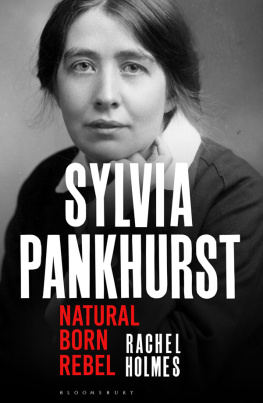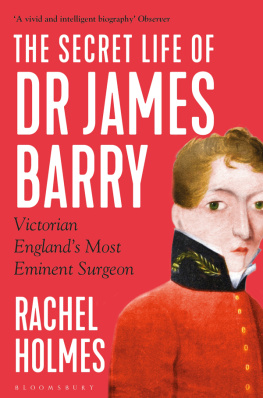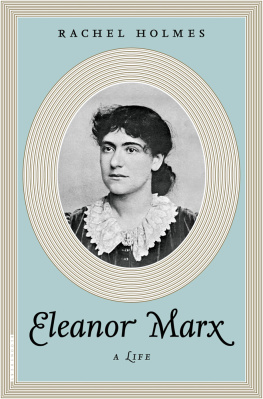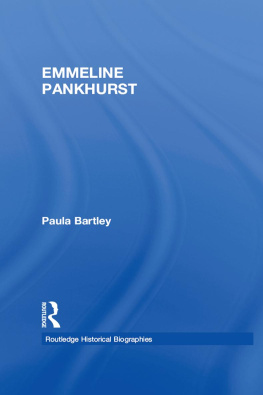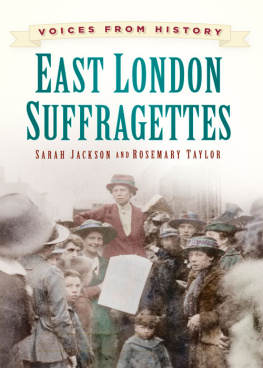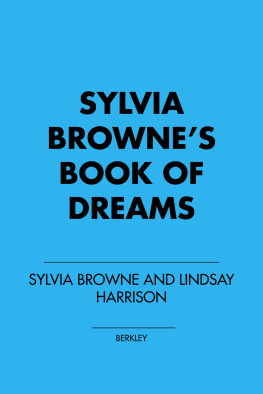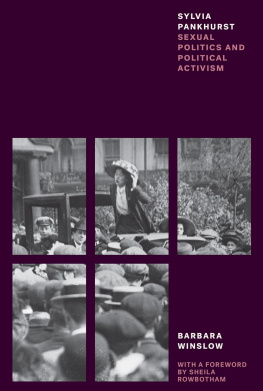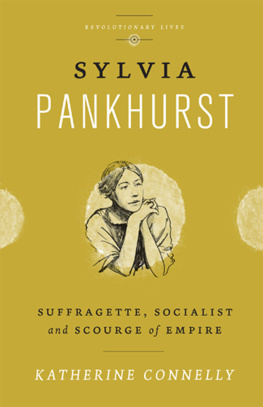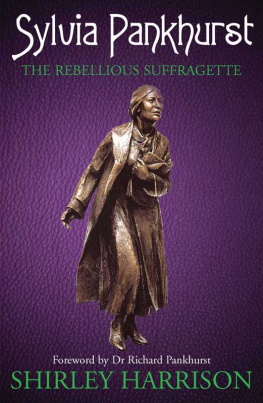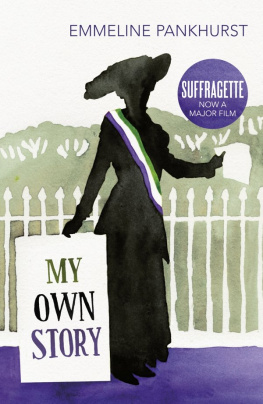
SYLVIA PANKHURST
BLOOMSBURY PUBLISHING
Bloomsbury Publishing Plc
50 Bedford Square, London, WC1B 3DP, UK
BLOOMSBURY, BLOOMSBURY PUBLISHING and the Diana logo are trademarks of Bloomsbury Publishing Plc
First published in Great Britain 2020
This electronic edition published 2020
Copyright Rachel Holmes, 2020
Rachel Holmes has asserted her right under the Copyright, Designs and Patents Act, 1988, to be identified as Author of this work
Image credits: Part One: International Institute of Social History; Part Two: International Institute of Social History; Part Three: Getty Images; Part Four: International Institute of Social History; Part Five: International Institute of Social History; Part 6: Getty Images
All rights reserved. No part of this publication may be reproduced or transmitted in any form or by any means, electronic or mechanical, including photocopying, recording, or any information storage or retrieval system, without prior permission in writing from the publishers
A catalogue record for this book is available from the British Library
ISBN: HB: 978-1-4088-8041-8; TPB: 978-1-4088-8042-5; EBOOK: 978-1-4088-8043-2
To find out more about our authors and books visit www.bloomsbury.com and sign up for our newsletters
ALSO BY RACHEL HOLMES
The Secret Life of Dr James Barry
The Hottentot Venus: The Life and Death of Sarah Baartman
Eleanor Marx: A Life
For Sarah and Ann
Accepting equality takes courage
Jodi Dean
the demanding, brilliant art of peace
Toni Morrison
she stares at the world,
takes it to the edge of
all the words
men werent able to invent
Nathalie Handal
Contents
Love and enthusiasm are the two great moving factors which make life worth living. This I aver in spite of all the materialists. A free spirit and a visionary, Estelle Sylvia Pankhurst was by nature an artist. Yet she became one of the greatest unsung political figures of the twentieth century.
She fulfilled the luminary and radical promise of her name. Estelle, for the stars. Sylvia, for the spirits of the wild forests and woodland of ancient Britain, whose folklore sylvan groves are the home of astonishing beings who delight gods and startle mortals. Her father nicknamed her Miss Woody Way. It was apparent from the very beginning that she would never settle for the easy path of least resistance.
Her surname placed her as a daughter of Britains best-known feminist family, leading from the front in the history of the struggle for Votes for Women. Sylvias mother Emmeline was Britains most famous suffragette. Her barrister father Richard known to all as the Red Doctor had drafted the 1870 Married Womens Property Act with his friend John Stuart Mill. Richard adored Emmeline and called her his queen. They had two sons and as is proper to a dynastic saga three daughters: first Christabel, next Sylvia and finally Adela.
The eldest Christabel intended to be the first woman lawyer in the land. Sylvias vocation was to be an artist. Little Adela just wanted her older siblings to notice her. In order to follow their dreams, the sisters had first to fight for their rights to them. Like Malala Yousafzai and Greta Thunberg, the Pankhurst girls became teen radicals recognized by millions as icons of their cause. Under Emmelines matriarchal leadership, they were educated in the activist school of Deeds, not words and were taught that their mothers exhortation to fight for Freedom or Death was not a rhetorical instruction.
They founded the Womens Social and Political Union in the cramped front parlour of their Manchester home at 62 Nelson Street in 1903. Within months of its formation the WSPU became known in the womens movement as the family party. Two years after Queen Victorias funeral the Pankhurst women crashed into national consciousness by creating a mass political movement on a scale unseen in Britain since the days of the Chartists. The Pankhursts political views are a subject for controversy, wrote a contemporary journalist, but we can surely all agree with regard to this remarkable family, that they are a British institution and a fine example of all that has been said or sung of British pluck.
Sylvia inherited her convictions via the cultural chromosomes of generations of her radical family who did not hold that social inequality was natural or human subjection inevitable. She inherited many -isms and -ists from her ancestors, political and philosophical tools for building equality and democracy in a Britain that at the time of her birth was deeply undemocratic. All women and the majority of working men were denied the right to vote and so prevented from enjoying full citizenship in their homeland.
Never baptized, Sylvia was instead plunged in infancy into a distinctively British secular home brew fermented from radical liberalism, Mancunian socialism and materialist Marxism, diluted with a trace of incorporeal Methodism whispering the possibility of transcendence for the perpetually struggling soul. Her mother was an atheist, her father agnostic. The Pankhursts were not Christian Socialists, radical reformist Jews, Hindu nationalists or secular cultural Muslims, but many of their friends and in their milieu were, and these strongly influenced the family.
Hers was in many ways an eccentric childhood, though with a Victorian domestic regimen built on large daily doses of character-building discipline and porridge. Self-mastery, mental toughness and fearsome physical and intellectual courage featured among Sylvias defining adult characteristics. Porridge she abhorred for life an unfortunate aversion, since she was to serve more sentences in Holloway Prison than any other suffragette.
The bestselling Australian writer Stella Miles Franklin, author of the international feminist hit My Brilliant Career , understood her friends popular appeal. Sylvia Pankhurst is slender and girlish in appearance, just the sort of typical English girl that one sees reading a love story on the Underground, or riding a wheel [bicycle] about the suburbs. In her youth, Sylvias big blue eyes, clear skin and abundant fair hair gave the misleading impression of blonde ethereality. Stella Franklin knew like many others that this belied the steely mettle that lay within the five-foot-four frame of her friend. Though she was of average height, many people perceived Sylvia as being much taller.
Judging by the voluminous number of descriptions they inspired, it was Sylvias large and expressive blue eyes, framed by luxuriant eyebrows, and her voice that most compelled. Her eyes were described as, at times, soulful and compassionate, at others fierce, flashing and piercing. Adela, who thought Sylvia had a horse face, regarded all this attention to her charisma as ridiculous guff. She wrote, with eye-rolling contempt, about her sisters long face and sharp shrill voice.
Interestingly, Sylvias youthful self-portraits capture something of the otherworldliness that people said they saw in her. By her mid-fifties, she had become notably striking. Howard Costers 1938 photographic portraits show her with an androgynous bobbed crop and the much lived-in face of an authoritative international stateswoman.
Sylvia was an extraordinarily gifted speaker. Above all else, it was her voice that persuaded, intrigued or infuriated. From tentative beginnings when she stood on a chair in the pouring rain nervously addressing a handful of stragglers, her voice grew to become an instrument of activism as vital as her pen and the printing presses of her newspapers. Radio recordings of her speaking sound to us now not like archaic communications from a different world, but modern, grounded and true. Her accents and tones connect us to her story. A history of British class is in Sylvias voice. It tells the techniques of a woman who has learned to command public space. Her voice makes you listen, not only because of her skills, but also because it isnt always clear where it might go. Between the layers of her original Mancunian accent and the Received Pronunciation drilled into her at the aspirational Manchester Girls School, there is a musicality that is all her own. Sylvias friend Nellie Cressall recalled, Of course we had a lot to put up with to begin with. We had everything thrown at us. Rotten eggs, tomatoes But
Next page
